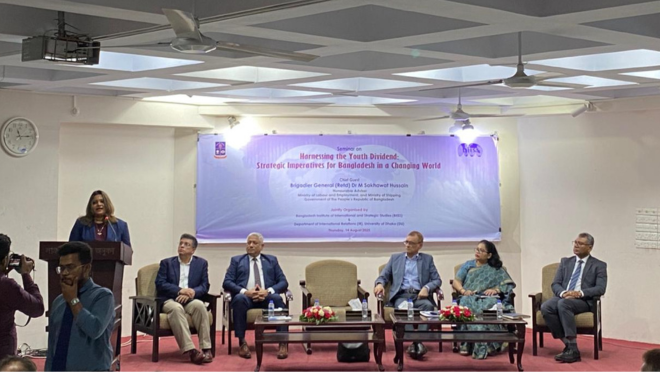BIISS and DU host seminar on Harnessing the Youth Dividend
BIISS and DU host seminar on Harnessing the Youth Dividend

Bangladesh Institute of International and Strategic Studies (BIISS) and Department of International Relations (IR), University of Dhaka (DU) jointly organised a seminar titled “Harnessing the Youth Dividend: Strategic Imperatives for Bangladesh in a Changing World” on 14 August 2025 at the Professor Muzaffar Ahmed Chowdhury Auditorium, Faculty of Social Sciences, University of Dhaka.
It was divided into four sessions, including an inaugural session and three consecutive thematic sessions. Following the opening remarks of Professor Dr. A S M Ali Ashraf, Chairman, Department of International Relations, University of Dhaka, Major General Iftekhar Anis, BSP, awc, afwc, psc, PEng, Director General of BIISS delivered the welcome address. Brigadier General (Retd) Dr M Sakhawat Hussain, Honourable Adviser, Ministry of Labour and Employment, and Ministry of Shipping graced the Seminar as the Chief Guest.
Professor Dr Sayema Haque Bidisha, Pro-Vice Chancellor (Administration), University of Dhaka was present as the Eminent Guest. Md Mahbub-Ul-Alam, Secretary, Ministry of Youth and Sports was also present as a Special Guest. HE Shiuneen Rasheed, High Commissioner of the Republic of Maldives to Bangladesh was the Guest of Honour at the inaugural session.
In the seminar, speakers emphasised the potential of Bangladesh’s youth dividend to sustain national development and also discussed ways to integrate youth perspectives into policymaking. As the Nations are striving for rapid advancement, hence they often depend heavily on their youth, harnessing their creativity, energy, and capacity to turn ideas into action.
This has been a constant throughout history—whether during the Renaissance, the Industrial Revolution, or in today’s era of social media and artificial intelligence.
In the sphere of climate action, young people in developing countries are at the forefront, championing campaigns, crafting grassroots innovations, and demanding climate justice with unwavering determination.
Countries like Singapore and South Korea achieved remarkable economic transformation by effectively leveraging their demographic dividends, while China’s sustained investment in its youth is now paying off. For Bangladesh, the youth dividend presents a significant demographic advantage: with nearly half the population under 30, the country stands at a pivotal juncture where today’s investment in young people can pave the way for future prosperity, stability, and innovation.
However, realising this potential requires deliberate nurturing and equipping youth with the skills needed to thrive. Speakers highlighted different dimensions of Bangladesh’s youth dividend—how it can be harnessed to sustain national progress, the importance of incorporating youth perspectives into policymaking, the challenges that may arise, and practical strategies for navigating and overcoming them in a rapidly evolving world. Following their remarks, Colonel A H M Yeaseen Chowdhury, MPhil, PhD, Research Director, BIISS delivered the Vote of Thanks.
Senior officials from different ministries of Bangladesh, foreign diplomatic missions, media, businesspeople, teachers and students from various universities, researchers, representatives from various think tanks, international organisations, enthusiastically participated in the seminar and enriched it by presenting their valuable opinions, comments, insights, suggestions, and observations during open discussion sessions.


